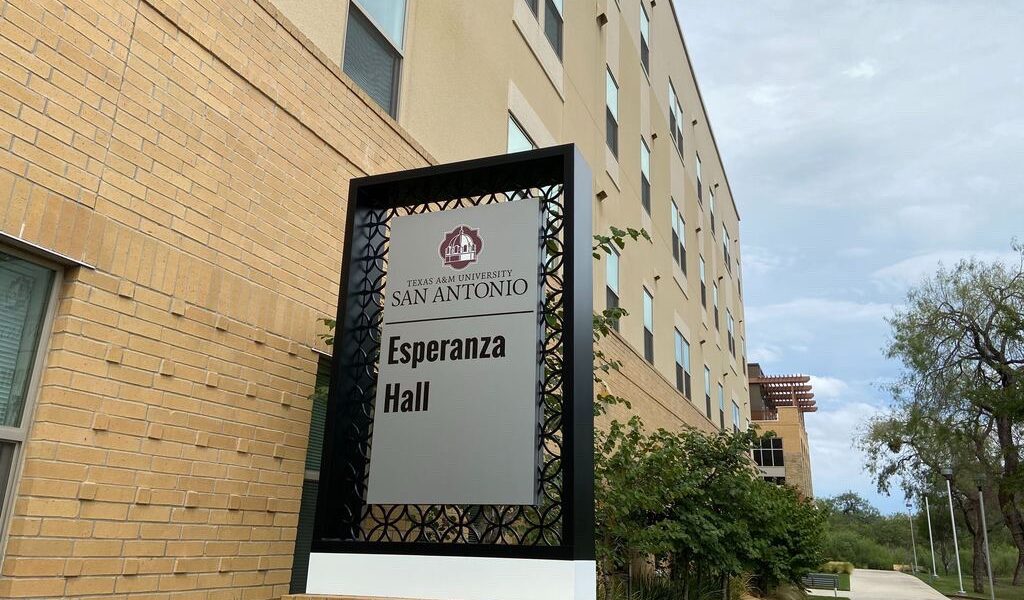No one wants to talk about Esperanza Hall.
The Mesquite has been pursuing a story to update readers on news about Esperanza Hall and construction of the new dorm, but officials will not respond to The Mesquite.
Mike Hiestand, senior legal counsel at the Student Press Law Center said readers might wonder what university officials are trying to hide when they don’t respond to the media.
Hiestand spoke with The Mesquite about the importance of transparency between universities and their students.
Students are consumers, Hiestand said. Aside from paying tuition, if they have a current job, students are also taxpayers. He noted that students’ money goes toward the construction of new buildings on campus, including the residence hall that is currently under construction.
“People don’t like being questioned or second-guessed on what they are doing. In many cases they don’t like to be held accountable,” Hiestand said. Student journalists are prone to encountering situations where sources will avoid being questioned.
“Sometimes they (journalists) are seen as a thorn in the side,” Hiestand said.
The role of a journalist is to report news, interview, ask questions and investigate. Although it varies among institutions, some universities appreciate their student journalists and the responsibility they have to get information out to readers.
Just like institution officials, the student media has a job, and both can work together and create an honest and open relationship with each other.
“They don’t have to keep things secret and see the student media as the enemy,” Hiestand said.
Student journalists should recognize their power, which is the key to successfully obtaining information. If students hit walls, Hiestand said they should know that there are other avenues to obtain information.
Diving into public records that can be provided by police departments, consulting with alumni who have donated to the institutions or contacting higher officials to let them know the situation are other options provided by Hiestand. Once evidence is gathered, consulting back with officials who have turned a blind eye to student journalists can motivate them to speak up and be open with their audience.
Don’t give up, Hiestand advised.
“It can be intimidating but be persistent, keep knocking on that door and making those phone calls,” he said.
Recognizing there are other doors that can open, student journalists should not stay seated if their institution is not being transparent.
On Sept. 5, The Mesquite emailed Gina Cowart, senior vice president of brand and marketing communications strategy at American Campus Communities, to request an interview. American Campus Communities is the manager of student housing communities, including Esperanza Hall. Cowart has not responded to The Mesquite.
On Sept. 7, The Mesquite called Cowart. Due to no answer, a voicemail was left.
On Sept. 5, The Mesquite emailed Dr. Corrin Le’Vasseur, executive director of operations at Texas A&M University-San Antonio, to request an interview about updates on the upcoming residence hall. The email was not answered.
On Sept. 7, The Mesquite called Le’Vasseur, a voicemail was left after no answer.
On Sept. 5, The Mesquite emailed Briana Fricks, contract services, assistant director at A&M-San Antonio. Fricks recommended that The Mesquite contact Dr. Reba Sims, director of student housing at A&M-San Antonio.
On Sept. 7, The Mesquite emailed Sims to request an interview but there was no response to the email.
On Sept. 12, The Mesquite visited Sims at her office, but she was not available. The Mesquite left contact information with the student workers at the front desk. The Mesquite did not hear from Sims.
On Sept. 12, The Mesquite visited Esperanza Hall and there were no managers available to speak with. Contact information was left at the front desk in hopes that officials at Esperanza Hall would reach back. There has been no response.
On Sept. 14 The Mesquite emailed Sam Boykin, senior communications manager, requesting contacts to be interviewed about Esperanza Hall and the residence hall under construction. Boykin provided The Mesquite with a couple of sources left to contact.
On Sept. 14 The Mesquite emailed Dr. Zeak Naifeh, dean of students, to request an interview. Dr. Naifeh redirected/forwarded the request for information from The Mesquite back to Boykin.
On Sept. 14 The Mesquite emailed Reed Vesey, director of assessment and communications for the division of student success & engagement, to request an interview. There was no response from Vesey.
On Oct. 2 The Mesquite emailed Dr. Don Albrecht, vice president emeritus of student engagement and success at Texas A&M University-Corpus Christi, requesting an interview about his insight on student housing overflow. Albrecht responded he could not help The Mesquite.
On Oct. 2 The Mesquite messaged Richard Delgado, senior community investor at Boeing, requesting an interview to discuss the responsibilities of his former director of housing position at A&M-San Antonio. Albercht responded that he was not sure what he could provide to the story after two years of being away from A&M-San Antonio. Delgado was not able to do the interview with The Mesquite.
On Oct. 5 The Mesquite emailed the Foundation for Individual Rights and Expression media department to request an interview about transparency in universities. The FIRE organization defends and promotes the value of free speech. The Mesquite was not able to obtain the interview.
On Oct. 6 The Mesquite emailed the Student Press Law Center media department to request an interview. The SPLC is an organization that defends the First Amendment and free press rights of student journalists. The Mesquite was able to interview Hiestand.







